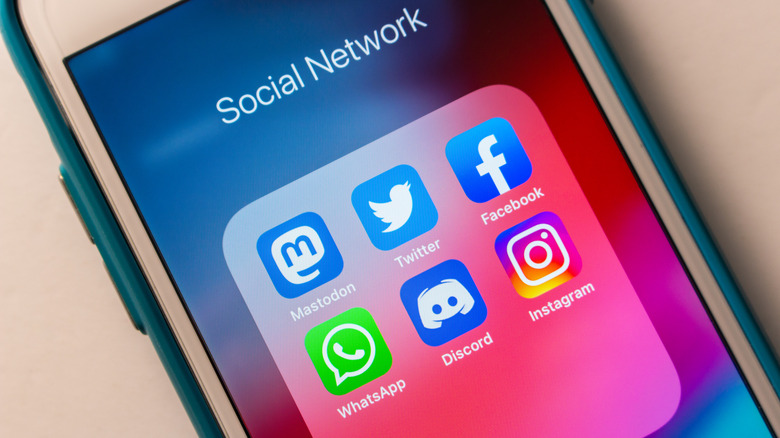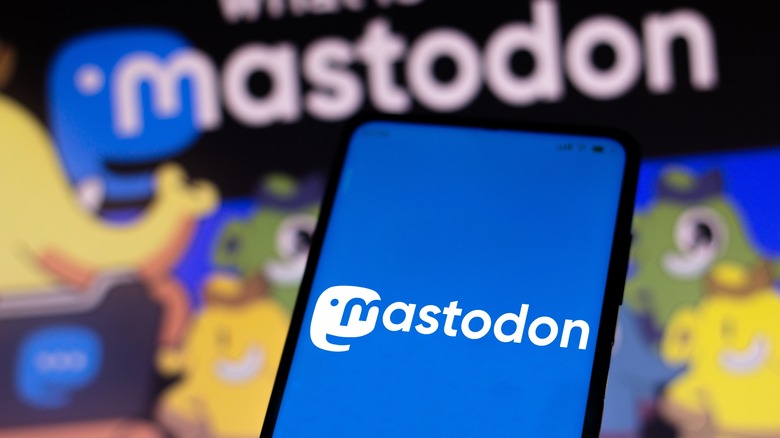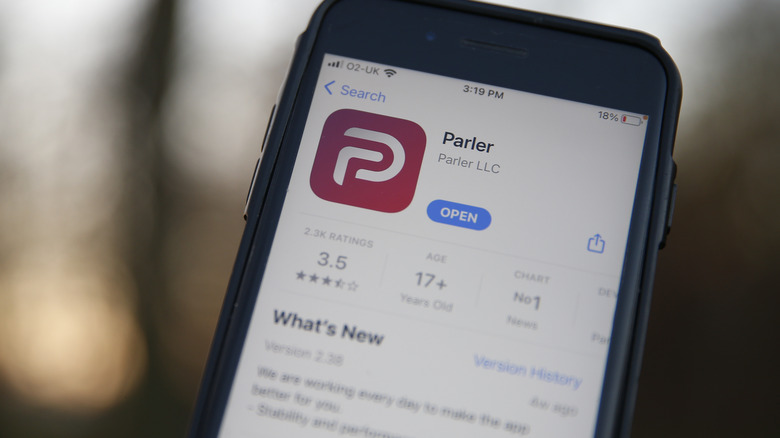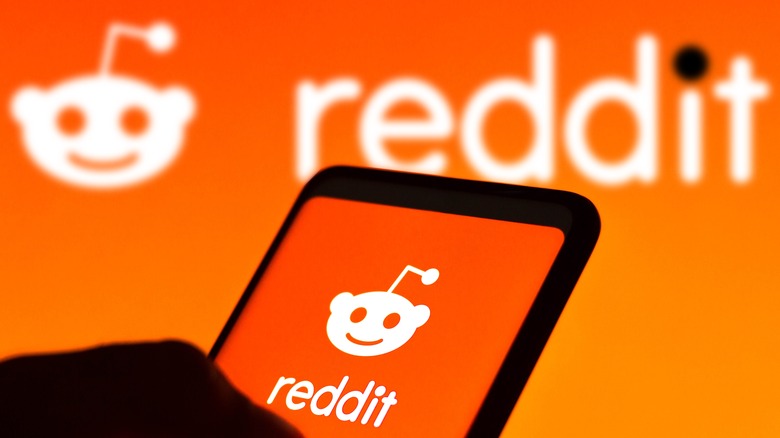5 Twitter Alternatives To Help You Move On From Elon
After months of uncertainty, Elon Musk's high-profile takeover of Twitter was finally completed at the end of October — but not everyone is happy with the billionaire's acquisition of the platform, and what he plans to do with it. Several of the sites' big names, including former professional wrestler Mick Foley, and controversial actress Amber Heard, appear to have deleted their accounts in the days following Musk's purchase of the company. Amongst the less famous, almost a million accounts have been deactivated since the takeover was completed.
A major source of controversy has centered around Musk's plans to turn Twitter into a free speech platform. While fans of the idea, including Musk himself, point toward how important free speech is to a functioning democracy and see platforms like Twitter as a kind of "digital town square" where people should be free to air their views, others aren't so keen. Critics claim Musk's plans will turn the social media network into a hotbed of abuse and misinformation. Musk himself has admitted there will be some limits and that the platform won't turn into an anything-goes "hellscape," but that hasn't stopped advertisers from pulling out while the situation develops.
Twitter only exists because people like spouting their thoughts and opinions, so naturally most of the exiles would like to continue sharing those opinions elsewhere. Alternatives are available, though as things stand, none of them are quite on par with Twitter. This could change in the future, or the other options may devolve into echo chambers. That said, you have a handful of options if you're looking for a new social media home.
Mastodon is a popular choice
One of the most popular choices at the moment seems to be Mastodon, an open-source social network. Mastodon is similar to Twitter in many ways and different in others. Users can tag other accounts, make posts only certain accounts can see (similar to locking your account on Twitter), and make posts that are visible to everyone. You can post images, videos, and polls. Posts will also show up chronologically by default, so you won't have to find and click the "see newest tweets first" button like you have to on Twitter every few weeks.
In terms of moderation, that's mostly up to the users themselves. Mastodon is set up in a way that allows users to create communities and each community is responsible for implementing its own rule set and dealing with users who break those rules. This design has both positives and negatives. On the one hand, it's possible to find or create a group that matches your interests and engage in discussion with like-minded people. On the other, there's a danger of entering an echo chamber. Echo chambers aren't necessarily bad, as there's nothing wrong with engaging in discussions with other people who share your viewpoint. However, the views that are seemingly popular may actually be niche on other platforms or in the real world.
Another issue with Mastodon is the size of its user base. According to its website, Mastodon has fewer than half a million active users — which is minuscule compared to the hundreds of millions who regularly log on to Twitter. Depending on how bad the Twitter exodus becomes, that number could change, and Mastodon will undoubtedly scoop up a fair number of exiles — provided its servers can handle the increased traffic.
Parler recently had a takeover of its own
Musk isn't the only billionaire who is scooping up social media platforms so they can live out their free speech fantasies. After being temporarily banned from Instagram and suspended from Twitter for making anti-Semitic remarks, rapper Kanye West announced he was buying Parler. Parler is a pretty similar platform to Twitter and has traditionally been marketed as a free speech alternative for people who have been banned from the platform. Like many Twitter alternatives, it has a small user base and has become somewhat of an echo chamber. Like similar sites Gab Social and Truth Social, the latter being the site Donald Trump founded after he was banned from Twitter and Facebook, the echoes in Parler's particular chamber tend to be of the right-wing variety.
As it was founded because of an issue Elon Musk seems to be targeting, Parler may actually lose users in the coming months as Twitter accounts begin to get unbanned. There's no confirmation on what Kanye's plans for the platform are, and it may be a struggle to keep Parler relevant, or at least as relevant as it's always been, as time goes on.
Reddit isn't the same, but it is popular
Reddit is one of the most popular sites on the internet. It's constantly evolving and may be the new home of many former Twitter users — some of whom will have had accounts anyway. If you've only ever used Twitter, Reddit will take a lot of getting used to. There are various subreddits with their own topics, so it's easy enough to find groups of people who have similar interests. Each subreddit is independently moderated, though there is a set of site-wide rules, and subreddits where major rule breaches repeatedly occur are in danger of being shut down.
Each post, whether it's text, an image, or a video, becomes its own thread. There is also a front page, which contains a mixture of threads from across the site, though you can opt to only view posts from subreddits you're a member of. The prominence of threads and replies is based on a voting system. Posts people agree with or see as high-quality tend to be upvoted, whereas low-quality ones tend to be downvoted.
If a post is heavily downvoted, it is hidden, and every up or downvote a person receives is added together to make up their Karma score. Extremely high karma doesn't really do much, while low karma can prevent users from posting in certain subreddits. Unlike many of the other alternatives, Reddit has been around for a long time and is very popular. This has led to the site developing its own culture. That culture seems to center on dad jokes and pop culture references, so if that isn't your thing, it's probably worth considering one of the other alternatives.
CounterSocial has several unique features
In terms of interface, Twitter exiles won't be completely lost if they choose to boot up CounterSocial. The platform claims to have "No trolls. No abuse. No ads. No fake-news. No foreign influence operations" due to its zero-tolerance stance on such matters. The site also promises it won't collect and sell your data. The site seems to blame several nations for the internet's bot problems. Because of this, they have a blanket ban on signups from Russia, China, Iran, North Korea, Pakistan, and Syria. CounterSocial also lists some interesting sounding tools that it claims will help it back up its promises.
The site says its Deepfake Detector "automatically analyzes uploaded content in near real-time to determine deepfake probability." It also claims it is the only social media network with this capability. CounterSocial has also partnered with Bot Sentinel to add a feature to the latter's browser extension, which flags "problematic migrating accounts." Fact Layer is another of the site's partnerships, offering "realtime inline automatic political bias leaning and fake news awareness." So if a news story is attached to a post, there's a color-coded estimation of its "truthfulness" and "political leaning." And one of the odder perks of CounterSocial is the identity theft alerts it offers; apparently, you'll be flagged if your details crop up on the dark web. There are numerous other tools aimed at combating things like child abuse, tracking, and stalking.
CounterSocial also has a presence in virtual reality, which is pretty unique as far as social media sites go. There are also desktop and phone apps available if putting on a pair of VR goggles doesn't appeal to you. In terms of monetization, free accounts are available as a premium service priced at $4.99 per month. The site also accepts donations.
Discord offers heavy customization
You may already be aware of Discord due to a pretty odd ad involving TV favorite and national treasure Danny DeVito. The platform was originally popular with gamers, giving them a place to discuss a game with their friends and chat with each other while playing. The basic functions that made it useful to the gaming community are still there. Text chat, voice chat, and private messaging are all options. The talking is done on various servers that are independently moderated and all have their own rules. A lot of the servers require an invite to join, but you can find invite links and search by keyword on websites like Disboard.
Discord can be accessed via a browser, desktop app, or phone app. The most significant difference with something like Twitter is centered on how you post. While most tweets can be viewed by anyone on the site, messages in Discord are limited to the server they were posted on. It's far closer to a chatroom than a microblogging site. Discord itself is best used in tandem with another network, and its design facilitates this. Many popular Reddit communities, gaming communities, and subreddits have their own dedicated discord servers.
This allows for more in-depth, faster-paced discussions while the slower stuff happens on the main platform. You can also choose to start your own server, implement your own rules, and take advantage of the wide level of customization the platform offers. Discord probably has the steepest learning curve of any of the platforms we've mentioned, but there are plenty of features that allow for a truly tailored social networking experience if you want to put the effort in.




